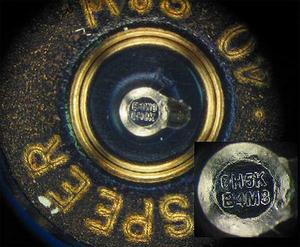Law enforcementWisconsin to consider gun-tracking bill
Lawmakers in Wisconsin are circulating a bill that would revive efforts to require that all semi-automatic handguns sold in the state contain “micro-stamping” technology that allows police to link spent shell casings to gun buyers; similar legislation introduced in 2009 was heavily opposed by gun interests and never brought to a vote

Casing marked with micro-stamp identifier // Source: ammoland.com
Two Milwaukee-area lawmakers are circulating a bill that would revive efforts to require that all semi-automatic handguns sold in the state contain “micro-stamping” technology that allows police, supporters say, to link spent shell casings to gun buyers. Similar legislation introduced in 2009 was heavily opposed by gun interests and never brought to a vote.
Micro-stamping is gaining popularity among national gun control groups, which are promoting its passage in state legislatures around the country. The NewsBuzz reports that so far, only California has passed a law requiring new guns sold in the state to use the technology. The law, passed in 2007, has yet to be implemented, however, because of a provision requiring micro-stamp technology to be “patent free” before the new requirements go into effect. A Seattle firm, ID Dynamics, currently holds the patent.
In guns equipped to leave micro-stamps, a raised surface is implanted inside the gun’s chamber, typically atop the firing pin, so it leaves a distinctive mark on the bullet’s shell casing as it leaves the gun. This “stamp” contains several letters or numbers, a code associated with the gun’s make, and serial number. Only semi-automatic handguns can leave micro-stamps: Revolvers cannot because their bullets have no shell casings.
Police already examine these casings for marks left by the barrels of guns — scratches left by slight imperfections in the barrels’ manufacturing. These examinations can be used to link casings found at scenes to firearms later recovered during investigations.
Supporters of micro-stamping argue the technology could provide investigators with a direct link to the gun’s original buyer, who, if not the person who committed the crime under investigation, might offer leads. Supporters also argue that micro-stamping might deter “straw purchasers” from buying guns for felons.
State Rep. Leon Young (D-Milwaukee) and State Sen. Spencer Coggs (D-Milwaukee) are seeking co-sponsors for the bill requiring all newly-manufactured guns sold in Wisconsin to have micro-stamping capability. The law would not take effect until 1 January 2013. Gun dealers who violated it would face fines, and owners who attempted to remove micro-stamps could be charged with a misdemeanor.
Critics, including the National Rifle Association, say the technology is unproven. State Rep. Scott Suder (R-Abbotsford), who opposed 2009’s micro-stamp bill, said in a recent statement, “This bill is dead on arrival. Micro-stamping is a costly and unproven science, and passing legislation like this would only guarantee one thing: higher gun prices for law-abiding citizens who use firearms for recreation and self-defense.”
Critics also argue that the guns, if taken apart, can be modified to remove the micro-stamps.
Most criminals, however, lack the expertise needed to make these modifications, Young says. “If you look at crimes that are committed, nine times out of ten, the people who are using guns are not that knowledgeable about how to use guns or change things out.”
The Coalition to Stop Gun Violence, a national anti-gun group, makes a similar assessment: “In the urgency under which crimes are committed, most criminals fail to do things as simple as wearing gloves to hide fingerprints.”
Young adds, “At the end of the day, we’re trying to make it safe out here for people and assist law enforcement.”
2009, the bill was backed by the City of Milwaukee, the Milwaukee Police Assocation union, the Wisconsin Chiefs of Police Association, the Wisconsin County Police Association, and the Wisconsin Coalition Against Domestic Violence. According to the state Government Accountability Board, supporters reported lobbying efforts totaling eighteen hours.
Opponents, however, reported 313 hours. Wisconsin Gun Owners Inc. reported 255 hours, the most of any group. A strong supporter of concealed carry, it calls itself “Wisconsin’s no-compromise gun lobby.” Other opponents included hunting groups, the Safari Club, and the Wisconsin Bear Hunters Association, the NRA (which reported just two hours) and the Wisconsin Sheriff’s and Deputy Sheriff’s Association.
Estimates on how much micro-stamping would add to the cost of an individual firearm vary widely. Those touted by opponents (including Suder) range as high as $200. Supporters say it would be less than $10. Young says the extra cost would be “minimal.”
In 2009, the state Legislative Fiscal Bureau noted, “the quality of the characters micro-stamped on shell casings may deteriorate over time as the stamping mechanism (in the gun) experiences more use.” This deterioration could require local police to send stamped casings to the state Department of Justice, where Scanning Electron Microscopes could better read them.
If police submit a “significant” number of such cases, the Fiscal Bureau added, the department “will not be able to absorb the increased workload and will require additional resources.”
